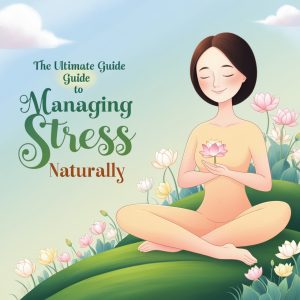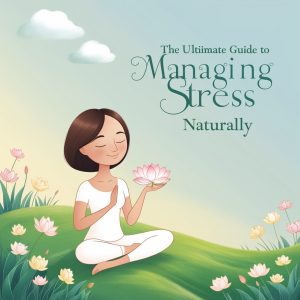The Ultimate Guide to Managing Stress Naturally

The Ultimate Guide to Managing Stress Naturally
Introduction
Stress is an inevitable part of life, but how we manage it can make all the difference. Whether it’s the pressures of work, personal challenges, or unforeseen circumstances, stress can have a significant impact on both our mental and physical well-being. But here’s the good news: you don’t always need medication to manage stress. There are numerous natural methods that can help you maintain balance and peace in your life. This guide will take you through everything you need to know about managing stress naturally, helping you to lead a healthier, more relaxed life.
Understanding Stress
The Science Behind Stress
Stress is your body’s natural response to any demand or threat. When you sense danger—whether real or imagined—the body’s defenses kick into high gear in a rapid, automatic process known as the “fight-or-flight” reaction. This reaction is a mix of psychological and physical responses, including the release of adrenaline and cortisol. While short-term stress can actually be beneficial, motivating you to tackle challenges, chronic stress can lead to serious health problems.
Types of Stress
Stress is not a one-size-fits-all phenomenon. It comes in different forms:
- Acute Stress: This is the most common form of stress, often arising from demands and pressures of the recent past or anticipated demands and pressures of the near future.
- Chronic Stress: This type of stress is long-term and can lead to significant health issues if not managed properly.
- Episodic Acute Stress: People who frequently suffer from acute stress are often experiencing episodic acute stress. This is common among individuals who take on too many responsibilities or who live chaotic lives.
Common Triggers of Stress
Identifying what causes your stress is the first step in managing it. Common triggers include:
- Work-related pressures
- Financial worries
- Health issues
- Relationship problems
- Major life changes
The Benefits of Managing Stress Naturally

Why Natural Methods Are Preferable
Natural stress management techniques often come without the side effects associated with medications. They promote holistic well-being and can be easily integrated into your daily routine, providing a sustainable way to manage stress over the long term.
Long-Term Benefits of Natural Stress Management
By adopting natural stress management techniques, you can improve your overall health, enhance your mood, increase your productivity, and prevent chronic stress-related conditions. Moreover, these methods can help you build resilience, making it easier to handle stressors in the future.
Lifestyle Changes to Combat Stress
Importance of a Balanced Diet
What you eat has a profound impact on your stress levels. A diet rich in fruits, vegetables, lean proteins, and whole grains can help stabilize your mood and energy levels, reducing the effects of stress.
The Role of Regular Exercise
Exercise is one of the most effective ways to combat stress. Physical activity increases the production of endorphins, the brain’s feel-good neurotransmitters. Whether it’s a brisk walk, yoga, or a gym session, regular exercise can help you manage stress.
Getting Enough Sleep
Sleep is essential for stress management. A lack of sleep can make you more susceptible to stress, while good sleep hygiene can help you wake up feeling refreshed and better able to handle daily challenges.
Mindfulness and Meditation
What is Mindfulness?
Mindfulness is the practice of staying present and fully engaging with the current moment without judgment. It helps you become more aware of your thoughts and feelings, allowing you to manage them better.
Benefits of Meditation
Meditation is a powerful tool for stress management. Regular meditation can reduce the density of the brain’s amygdala, the part responsible for fear and anxiety, making you more resilient to stress.
Simple Mindfulness Practices for Daily Life
You don’t need to meditate for hours to reap the benefits of mindfulness. Simple practices, like mindful breathing or taking a few minutes to observe your surroundings, can significantly reduce stress levels.
Breathing Techniques for Stress Relief

The Science of Deep Breathing
Deep breathing exercises can calm your mind by reducing the effects of the sympathetic nervous system, which is responsible for the fight-or-flight response. By slowing down your breathing, you can promote relaxation.
Different Types of Breathing Exercises
Some effective breathing techniques include:
- 4-7-8 Breathing: Inhale for 4 seconds, hold your breath for 7 seconds, and exhale for 8 seconds.
- Box Breathing: Inhale, hold, exhale, and pause for 4 seconds each.
- Abdominal Breathing: Focus on deep breaths that fill your belly rather than your chest.
How to Incorporate Breathing Exercises into Your Routine
Start with just a few minutes a day and gradually increase the duration as you become more comfortable. You can practice these techniques anywhere, whether you’re at work, home, or on the go.
Herbal Remedies for Stress Management
Overview of Herbal Remedies
Herbs have been used for centuries to manage stress and anxiety. They can be a natural and effective way to support your body’s stress response.
Top Herbs for Stress Relief
Some of the most effective herbs for stress relief include:
- Ashwagandha: Known for its ability to lower cortisol levels.
- Lavender: Promotes relaxation and reduces anxiety.
- Chamomile: Helps to soothe the nervous system and promote sleep.
How to Use Herbal Remedies Safely
Before using any herbal remedy, it’s important to consult with a healthcare provider, especially if you’re taking other medications. Herbs can be consumed in various forms, including teas, capsules, or tinctures.
Aromatherapy: Healing with Scents
What is Aromatherapy?
Aromatherapy involves using essential oils extracted from plants to promote physical and emotional well-being. These oils can be inhaled or applied to the skin.
Best Essential Oils for Stress Relief
Some of the best essential oils for managing stress include:
- Lavender: Calming and relaxing.
- Bergamot: Uplifting and mood-enhancing.
- Frankincense: Grounding and soothing.
How to Use Essential Oils Effectively
You can use essential oils in various ways, such as adding them to a diffuser, creating a relaxing bath blend, or applying them to pulse points on your body.
The Power of Physical Activity
How Exercise Reduces Stress
Exercise not only improves your physical health but





